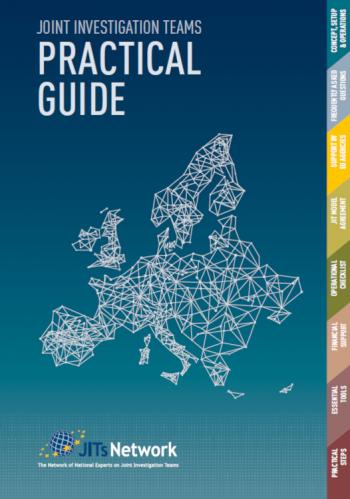Guidance for JITs

At the end of 2021, the JITs Network published an updated JITs Practical Guide. The new edition includes new chapters covering practical steps to set up a JIT, financial support to JITs and essential tools for practitioners. The Guide also reflects changes in the legal framework, improved knowledge and updated practices, as well as new information on additional support JIT parties can receive from EU agencies and bodies.
The JITs Network and Eurojust also agreed on a revised text of Appendix I to the model agreement for establishing a JIT, taking account of changes in the legal framework governing Eurojust, Europol and the European Anti-Fraud Office (OLAF), and the need to reflect the specific conditions relating to their participation in a JIT. The Council Resolution on a revised text of Appendix I was approved on 22 December 2021 and published in the Official Journal of the EU.
In 2021, the JITs Network Secretariat initiated an update of the existing Fiches Espagnoles. Fiches are now available for all EU Member States and nine third countries (Albania, Georgia, Montenegro, North Macedonia, Norway, Serbia, Switzerland, Ukraine and the United Kingdom).
Ever growing involvement of third countries in JITs
With organised crime increasingly operating on a global scale, the number of JITs with third countries is growing rapidly. Cooperation with third countries was also a central theme of the 17th Annual Meeting of the Network of National Experts on JITs that took place in October 2021.
Convictions in UK for Slovak gang behind modern slavery case
Justice done: In May 2021, five members of a Slovak OCG were sentenced to up to eight years in prison for the exploitation of fellow nationals in a case of modern slavery and money laundering in the United Kingdom.
Crime: Between 2008 and 2017, the OCG recruited more than 60 underprivileged Slovak citizens for work in the UK, promising weekly salaries of over EUR 400. In reality, the victims were forced to work up to 14 hours a day, six days per week, and received very little payment while living in very poor conditions. The criminal gang told the victims that most of their earnings had to be used for accommodation, transport and food.
Eurojust's Role: At the request of the British authorities, Eurojust initiated judicial cooperation with Slovakia in 2015 and set up a JIT. With Eurojust funding, the JIT supported the speeding up of investigations, culminating in a successful action day in 2019. Eurojust also facilitated the issuance and execution of EAWs and EIO.
Judicial tool: In an evaluation in 2021, the JIT was highlighted as an example of successful cooperation.

Commission plans for further digitalisation of JITs
In 2021, the COVID-19 pandemic clearly demonstrated the evolving need for the digitalisation of cross-border judicial cooperation, including JITs. The proposal from the Commission to establish a JIT Collaboration Platform aims to provide technological support to those involved in JITs, to increase the efficiency and effectiveness of cross-border investigations and prosecutions.
The Commission consulted the JITs Network to ensure that the JIT CP will properly address the operational needs of JIT practitioners and assess the possibility of using existing tools and projects managed by the JITs Network Secretariat.
